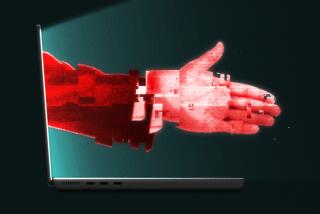Cash beats path to buyout fund
Pension funds and other big investors have been warned to scale back their return expectations in the private-equity buyout business.
But they still committed $2.75 billion to a new leveraged buyout fund launched by Beverly Hills-based Platinum Equity. That was $1.25 billion more than Platinum CEO Tom Gores’ target, he said -- and $2.05 billion more than went into his first such fund, in 2004.
The private-equity business isn’t what it used to be, but a lot of institutional investors may figure they won’t do better elsewhere, given the sorry state of financial markets.
Gores, who founded Platinum in 1995 to take significant stakes in companies or acquire them outright, has made 91 business purchases since then. He still has 22 firms in his portfolio, including steel products distributor Ryerson Inc., broadband telecom company Covad Communications Group and custom-car-wheel supplier Wheel Pros Inc.
Other companies he bought have been sold over the years, reaping annualized returns of 75% or better on investors’ initial capital, according to Gores.
That’s the central idea in private equity: Find a business that isn’t performing up to its potential, buy it with a relatively small cash down payment and a hefty loan, fix it up and resell it for a substantial profit.
When money is easy and the economy is robust, savvy private-equity deal makers can flourish. Gores, 44, has done well enough in the buyout business over the last 13 years to make Forbes’ global billionaires list. He’s No. 553 this year, with an estimated net worth of $2.2 billion.
(He also faced some unwanted publicity in the spring after a private relationship became a subject of testimony in the government’s trial of Hollywood private eye Anthony Pellicano.)
But private equity’s boom times ended with the credit crunch. Through mid-August, the number of takeover deals by U.S. private-equity firms was down 35% year to date from the same period of 2007, to 371 transactions, according to Dealogic Inc.
Gores concedes that, with lenders reluctant to fund deals, he may have to put up far more cash for businesses he buys -- which, in turn, could mean lower investment payoffs, because it’s the leverage in buyouts that makes for super-size returns.
So for a new buyout fund, what might private-equity investors consider a good return? Gores said 15% to 30% annualized gains could make many investors happy. But naturally, he said he’s hoping to do better than that.
As for the risks inherent in the weak economy, Gores says he hasn’t seen any reason to be alarmed by the business trends at his portfolio companies.
“Other than the credit markets,” he says, “it’s not as bad as it seems.”
--
Almost, maybe, soon, hopefully
Can you stand another we’re-almost-there-but-not-quite-yet prediction on the end of the housing market bust?
The latest came from Home Depot Inc. CEO Frank Blake at a retailing conference in New York.
“We don’t think we’ve hit the bottom, but certainly from where we are now, at least in any historic context, we’re getting awfully close to the bottom,” Blake said Wednesday, according to Bloomberg News. “We don’t think we’re at the bottom yet, but we think we can probably see it from here.”
Home Depot’s profit has declined for eight consecutive quarters. The Atlanta company’s stock, which peaked at $43.95 in July 2005, made its own bottom this summer at $21.46 on July 15. It has snapped back since then and received a further lift from Blake’s comments, jumping $1.26, or 4.5%, to $29.33.
--
More to Read
Inside the business of entertainment
The Wide Shot brings you news, analysis and insights on everything from streaming wars to production — and what it all means for the future.
You may occasionally receive promotional content from the Los Angeles Times.








